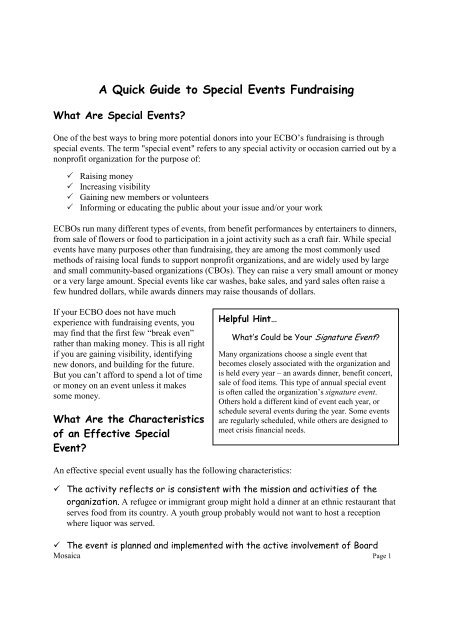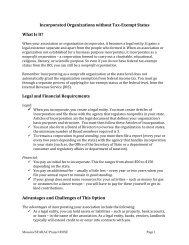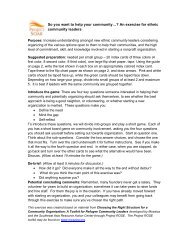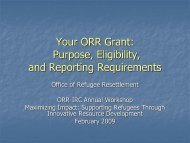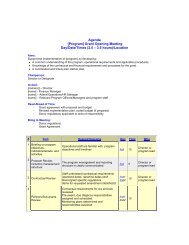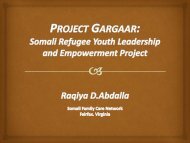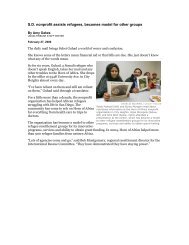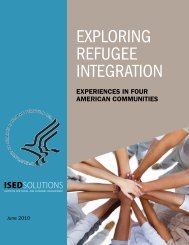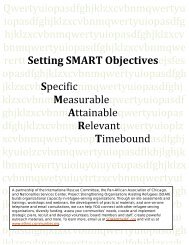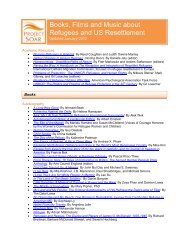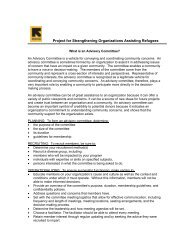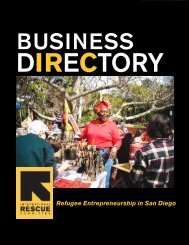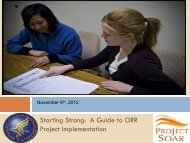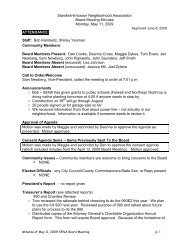A Quick Guide to Special Events Fundraising - ethniccommunities.org
A Quick Guide to Special Events Fundraising - ethniccommunities.org
A Quick Guide to Special Events Fundraising - ethniccommunities.org
Create successful ePaper yourself
Turn your PDF publications into a flip-book with our unique Google optimized e-Paper software.
A <strong>Quick</strong> <strong>Guide</strong> <strong>to</strong> <strong>Special</strong> <strong>Events</strong> <strong>Fundraising</strong>What Are <strong>Special</strong> <strong>Events</strong>?One of the best ways <strong>to</strong> bring more potential donors in<strong>to</strong> your ECBO’s fundraising is throughspecial events. The term "special event" refers <strong>to</strong> any special activity or occasion carried out by anonprofit <strong>org</strong>anization for the purpose of:̌ Raising money̌ Increasing visibility̌ Gaining new members or volunteerš Informing or educating the public about your issue and/or your workECBOs run many different types of events, from benefit performances by entertainers <strong>to</strong> dinners,from sale of flowers or food <strong>to</strong> participation in a joint activity such as a craft fair. While specialevents have many purposes other than fundraising, they are among the most commonly usedmethods of raising local funds <strong>to</strong> support nonprofit <strong>org</strong>anizations, and are widely used by largeand small community-based <strong>org</strong>anizations (CBOs). They can raise a very small amount or moneyor a very large amount. <strong>Special</strong> events like car washes, bake sales, and yard sales often raise afew hundred dollars, while awards dinners may raise thousands of dollars.If your ECBO does not have muchexperience with fundraising events, youmay find that the first few “break even”rather than making money. This is all rightif you are gaining visibility, identifyingnew donors, and building for the future.But you can’t afford <strong>to</strong> spend a lot of timeor money on an event unless it makessome money.What Are the Characteristicsof an Effective <strong>Special</strong>Event?Helpful Hint…What’s Could be Your Signature Event?Many <strong>org</strong>anizations choose a single event thatbecomes closely associated with the <strong>org</strong>anization andis held every year – an awards dinner, benefit concert,sale of food items. This type of annual special eventis often called the <strong>org</strong>anization’s signature event.Others hold a different kind of event each year, orschedule several events during the year. Some eventsare regularly scheduled, while others are designed <strong>to</strong>meet crisis financial needs.An effective special event usually has the following characteristics: The activity reflects or is consistent with the mission and activities of the<strong>org</strong>anization. A refugee or immigrant group might hold a dinner at an ethnic restaurant thatserves food from its country. A youth group probably would not want <strong>to</strong> host a receptionwhere liquor was served. The event is planned and implemented with the active involvement of BoardMosaica Page 1
members and volunteers, not just staff. Large events often require extensive stafftime, but the involvement of volunteers – especially in planning and marketing – is extremelyimportant. The event reaches and involves new people, expanding the <strong>org</strong>anization's constituencyand visibility. The event is special in some way - creative, unusual, just right for the <strong>org</strong>anization andcommunity.What Are Some of the Challenges of <strong>Special</strong> <strong>Events</strong>?While special events have many benefits, they can also present major challenges. For example: To be successful, a special event usually requires a good deal of effort <strong>to</strong> planand implement, including many hours of effort by volunteers or staff. Many events do not make money, or make only a small amount of money. If the returnon the time invested is small, the <strong>org</strong>anization might better use the time <strong>to</strong> write proposals orcarry out other forms of resource development that might provide a greater return. An <strong>org</strong>anization may find it hard <strong>to</strong> determine what kind of special event islikely <strong>to</strong> succeed. Trial and error is instructive, but can be costly; your <strong>org</strong>anization doesnot want <strong>to</strong> have <strong>to</strong> try three or four types of events before finding one that works. Some special events require an up-front investment of money; usually, the eventsmost likely <strong>to</strong> provide a high monetary return also require a significant monetary investment.For example, an event held in a large facility -- a dinner, benefit concert, or dance, forexample -- is likely <strong>to</strong> require a deposit. <strong>Special</strong> events, especially large events, often require many months of lead timefor planning and marketing. A small-scale event might be planned and implementedquickly <strong>to</strong> help meet "crisis" financial needs, but a large event takes time <strong>to</strong> plan.Getting Started – Helpful HintsIf you are just getting started at special events fundraising, here are some hints that can contribute<strong>to</strong> a financially successful special event: Consider "piggybacking" your event on some activity that is already planned, soMosaica Page 2
you need plan only your activity. For example, your <strong>org</strong>anization might staff a food table at astreet or craft fair, or sell t-shirts at some other community event. You can piggyback on yourown events; for example, if you are hosting a conference, add some kind of fundraising eventin the evening. Consider a partnership eventinvolving several <strong>org</strong>anizations. Acraft fair or benefit concert that may be<strong>to</strong>o much for one <strong>org</strong>anization workingalone may be quite manageable as a jointeffort. Just be sure you agree formally onthe amount of effort each group will putforth, how financial risk will be shared,and how funds raised will be allocated. Build on a tradition. For example, sellflowers on Mother’s Day, or sell fooditems appropriate <strong>to</strong> a particular holiday. Establish a committee <strong>to</strong> takeresponsibility for the event. Ideally,the committee should be led by boardmembers and other volunteers, not staff.Helpful Hint…Examples of Successful ECBO <strong>Events</strong>Be sure the group is large enough and has time enough <strong>to</strong> carry out the required planning andimplementation. Be sure members include individuals with a range of skills, from planning <strong>to</strong>handling money <strong>to</strong> marketing. Brains<strong>to</strong>rm possible events and then assess them based on practical, agreeduponcriteria, such as amount of lead time required, up-front funds required, level of effort,relevance <strong>to</strong> the <strong>org</strong>anization's mission, potential return on investment of time and money,probability of financial failure, non-financial benefits, etc. Test your ideas for a special event with individuals from the target community.Call three people from each major population group you will be targeting and get theirreactions <strong>to</strong> several ideas. See how much they would be willing <strong>to</strong> contribute <strong>to</strong> the event, orhow much they would pay <strong>to</strong> attend it. If the results of your informal survey are negative,look for another idea for an event. Find out what types of events have been tried in your community, by whom, andwith what level of success. Call similar <strong>org</strong>anizations that are about the same size inother cities or regions <strong>to</strong> learn from their experience. Try <strong>to</strong> get someone with special eventsexperience <strong>to</strong> serve on your committee and share his/her knowledge.Mosaica Page 3An annual multi-course dinner at a popular Asianrestaurant, with entertainment provided bychildren performing traditional dances.A benefit performance of a multicultural play,with extra money made through refreshment salesand a reception for sponsors <strong>to</strong> meet the ac<strong>to</strong>rsand playwright.A talent show by the ECBO’s youth clients, withfood prepared by their parents.Participation in a community arts festival, withECBOs selling food and crafts made by clientfamilies.A reception and silent auction, with items for theauction donated by Board members, areamerchants, and embassies or consulates.
Pick the right date. Be sure no other major event that may appeal <strong>to</strong> your targetedparticipants is scheduled for the same day. Pick a time when people are likely <strong>to</strong> be ready forthe kind of event you are planning. Consider how the weather could affect your event, andschedule at a time of year when the possibility of weather problems is small. Set a date thatgives your <strong>org</strong>anization enough lead time <strong>to</strong> plan a successful event. Plan the event in detail, identifying and scheduling major tasks. Use "post it" notesor some other visual approach <strong>to</strong> list the major tasks required <strong>to</strong> carry out the event, and thenplace them on a calendar, working backwards from the planned date of the event. You mayfind you need more lead time. When you are finished, be sure someone writes down all thetasks, dates, and responsibilities. Be sure you have enough volunteers <strong>to</strong> plan and carry out the event. Once youhave identified tasks and dates, figure out how many people and how many person-hours arerequired for each task – and be sure you can recruit them. Before finalizing your event, anticipate issues and challenges. Ask the difficultquestions at the planning stage, <strong>to</strong> be sure you can find the answers. Encourage someone <strong>to</strong>play "devil's advocate," questioning assumptions about sales, costs, and other fac<strong>to</strong>rs.Consider "worst-case' scenarios. If the risk is <strong>to</strong>o great for the <strong>org</strong>anization <strong>to</strong> manage, findanother type of event. Wherever possible, get donations of materials and services needed for theevent. Often, you can get printing of invitations donated, soft drinks provided by a beveragecompany, and a music group paid for by a media or beverage company. Give continuing attention <strong>to</strong> marketing. Devise marketing plans, assignresponsibilities, prepare the responsible individuals, and moni<strong>to</strong>r carefully. Document and evaluate the process, so the next event will be easier <strong>to</strong> plan andimplement – and so that your <strong>org</strong>anization learns from experience. If you find an event that works well, make it your "signature event." Hold thesame kind of event each year, making it bigger, better planned, and more successful each yearby building on experience.<strong>Special</strong> events are an important source of flexible funds for many <strong>org</strong>anizations, as well as ameans of gaining positive visibility and attracting new volunteers and clients. They deserveserious attention as part of a comprehensive resource development plan.Mosaica Page 4
Tools You Can UseSample <strong>Special</strong> Event Evaluation FormNote: This form can be used by an event planning or steering committee <strong>to</strong> evaluate the specialevent. We recommend <strong>org</strong>anizing an evaluation meeting within two weeks after an event andtalking through these questions. The evaluation is designed <strong>to</strong> help planning committees identifyways <strong>to</strong> improve upon their efforts for the following year and/or other events. In addition, at leas<strong>to</strong>ne members of the committee should take notes and volunteer <strong>to</strong> complete this form for youplanning files. This evaluation can then serve as the basis for planning and makingimprovements next year!Event: _______________________________________________Location: _______________________________________________Date: _______________________________________________Members of the Event Steering or Planning Committee:Overall Evaluation1. What were your goals and objectives for the event? At the end of the event, what outcomesdid you expect <strong>to</strong> achieve? (e.g., raise x amount of money, have x number of people attend,have x number of people request more information, recruit x number of new volunteers,media coverage, etc.)2. Overall, how successful were you in meeting those goals and objectives for the event?Not at all A Little Moderately VeryDiscuss/Explain your response. Note any unexpected outcomes.Mosaica Page 5
Planning/Preparation1. Overall, how would you describe the planning and preparation for the event? What workedwell and what could work better?2. Did you have participation of all steering committee members in the planning process? Didmembers share equally in the planning/preparation responsibilities?3. Did you have enough time <strong>to</strong> adequately plan and prepare? Would you change the timeline inany way next year? (for example, are there some tasks that need <strong>to</strong> be done earlier/later?)4. Did your work plan capture all of the needed tasks/responsibilities? Were there anytasks/activities/responsibilities you overlooked and that should be included next year?5. How clear were the roles and responsibilities of planning committee members and othervolunteers clear? Did all planning committee members/volunteers understand which tasksthey were responsible for? Were there tasks that needed more/fewer people working onthem?6. Identify the 2 or 3 most important changes you should make <strong>to</strong> improve planning andpreparation for next year’s event.Outreach/Attendance7. Overall, how would you describe the outreach for the event? What worked well and whatcould work better?8. To what extent did you meet your objectives for numbers/attendance?9. How successful was the event in reaching both existing “friends” of the <strong>org</strong>anization as wellas making new “friends”?Mosaica Page 6
10. How well did you reach/have representation from key supporters or potential supports of the<strong>org</strong>anization? (such as funders, local business owners, faith leaders, elected officials)?11. How well did you reach/have representation from the community you serve/advocate for?12. To what extent were able <strong>to</strong> track attendance and obtain contact information for all attendees?13. Identify the 2 or 3 most important changes you should make <strong>to</strong> improve outreach andattendance for next year’s event.The Event Itself14. Overall, how would you describe the event itself? What worked well and what could workbetter?15. To what extent was the event well <strong>org</strong>anized? To what extent did the program run smoothly?Are there aspects of the event that could have been better <strong>org</strong>anized or aspects of the eventthat could have run more smoothly?16. Do you feel the event/program successfully communicated the messages you sought <strong>to</strong>communicate about your <strong>org</strong>anization, its programs, and the broader issues you seek <strong>to</strong>address and raise awareness about?17. Did the program start on time and end on time? Are there aspects of the event you wouldshorten or allow more time for next year?18. Did the planning committee members and volunteers have clear roles and responsibilities atthe event? Were there any tasks/duties that had <strong>to</strong>o many volunteers/committee membersassigned <strong>to</strong> it or <strong>to</strong>o few? Did you have enough volunteers the day of the event?19. How was the food? Was there <strong>to</strong>o much? Too little? Enough variety? Options for peoplewith dietary restrictions?20. Identify the 2 or 3 most important changes you should make <strong>to</strong> improve the event itself nextyear.Mosaica Page 7
Budget/FinancesCash Expenses covered by the <strong>org</strong>anizationStaff time:Supplies:Outreach materials:Space rental:Rental equipment:Food/Snacks:Local travel/Mileage Reimbursement:Other:Total Expenses: __________In-Kind Contributions for the Event# Volunteer hours/value of hours:Supplies:Outreach materials:Space rental:Rental equipment:Food/Snacks:Local travel/Mileage Reimbursement:Other:Total In-Kind: __________Earned Income from the EventSponsorships:Advertising:Admission:Additional contributions:Other:Total Earned Income: __________NET INCOME: __________(Total Cash Income minus Total Cash Expenses)Mosaica Page 8
Checklist for Attachments <strong>to</strong> this Evaluation Report__ Planning Committee Workplan and Timeline__ Outreach materials and list of outreach strategies__ Invitations <strong>to</strong> speakers, honorees, etc.__ Copy of the Program__ List of sponsors, contribu<strong>to</strong>rs, or businesses who bought ads__ List of volunteers with contact information__ Press clips from any press coverage__ Quotes from participants/attendees (either gathered through a sign in book onsite or follow up emails or letters)__ Thank you notes (attach list)Narrative Report Completed by (print name):_________________________________Signature ____________________________Date ___________________Mosaica Page 9


